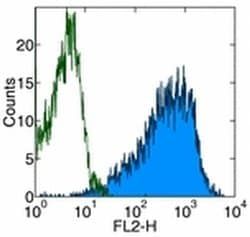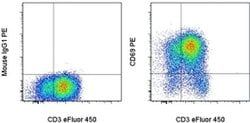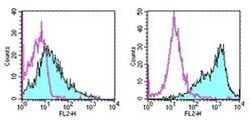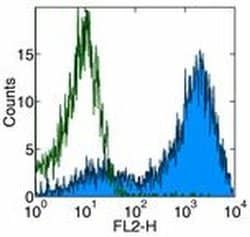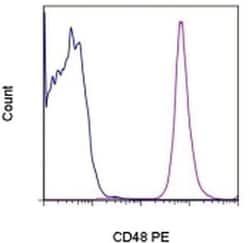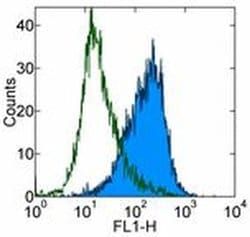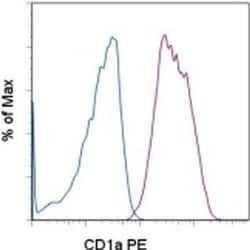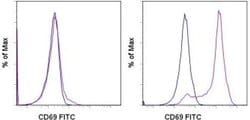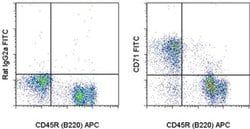CD69 Monoclonal Antibody (H1.2F3), FITC, eBioscience™, Invitrogen™
Armenian Hamster Monoclonal Antibody
Manufacturer: Fischer Scientific
The price for this product is unavailable. Please request a quote
Antigen
CD69
Concentration
0.5 mg/mL
Classification
Monoclonal
Form
Liquid
Regulatory Status
RUO
Formulation
PBS with 0.09% sodium azide; pH 7.2
Gene Alias
5830438K24Rik; Activation inducer molecule; activation inducer molecule (AIM/CD69); AI452015; AIM; BL-AC/P26; CD69; CD69 antigen; CD69 antigen (p60, early T-cell activation antigen); CD69 molecule; CLEC2C; C-type lectin domain family 2 member C; C-type lectin domain family 2, member C; EA1; early activation antigen CD69; early lymphocyte activation antigen; early T-cell activation antigen p60; GP32/28; leukocyte surface antigen Leu-23; MLR-3; VEA; Very Early Activation Antigen
Gene Symbols
CD69
Primary or Secondary
Primary
Content And Storage
4° C, store in dark, DO NOT FREEZE!
Gene
CD69
Clone
H1.2F3
Applications
Flow Cytometry
Conjugate
FITC
Host Species
Armenian Hamster
Target Species
Mouse
Gene Accession No.
P37217
Gene ID (Entrez)
12515
Isotype
IgG
Purification Method
Affinity chromatography
Product Type
Antibody
Description
- Description: The H1.2F3 monoclonal antibody reacts with mouse CD69, also known as very early activation antigen (VEA)
- CD69 is approximately 35 kDa and is expressed on the surface as a disulfide-linked dimer
- While a small subset of lymphocytes in the thymus, spleen and lymph nodes express this antigen, activation of both T and B cells rapidly upregulates the surface expression of CD69, suggesting a role for CD69 in lymphocyte development and activation
- Applications Reported: The H1.2F3 antibody has been reported for use in flow cytometric analysis
- Applications Tested: The H1.2F3 antibody has been tested by flow cytometric analysis of resting and activated mouse splenocytes
- This can be used at less than or equal to 0.5 μg per test
- A test is defined as the amount (μg) of antibody that will stain a cell sample in a final volume of 100 μL
- Cell number should be determined empirically but can range from 10^5 to 10^8 cells/test
- It is recommended that the antibody be carefully titrated for optimal performance in the assay of interest
- Excitation: 488 nm; Emission: 520 nm; Laser: Blue Laser
- Filtration: 0.2 μm post-manufacturing filtered
- CD69 (AIM, Active Inducer Molecule) is a gp28/34 disulfide bonded homodimer with a molecular weight of 60 kDa under non-reducing conditions
- CD69 contains one or two N linked oligosacaride and the molecule is present on activated platelets
- In normal peripheral blood a variable percentage of cells express the CD69 antigen, and it is involved in lymphocyte signal transduction
- Expression CD69 is induced upon activation of T lymphocytes, and may play a role in proliferation
- Furthermore, the protein may act to transmit signals in natural killer cells and platelets
- Alternative splicing results in multiple transcript variants of CD69
- Diseases associated with CD69 dysfunction include coccidiodomycosis and asthma.
